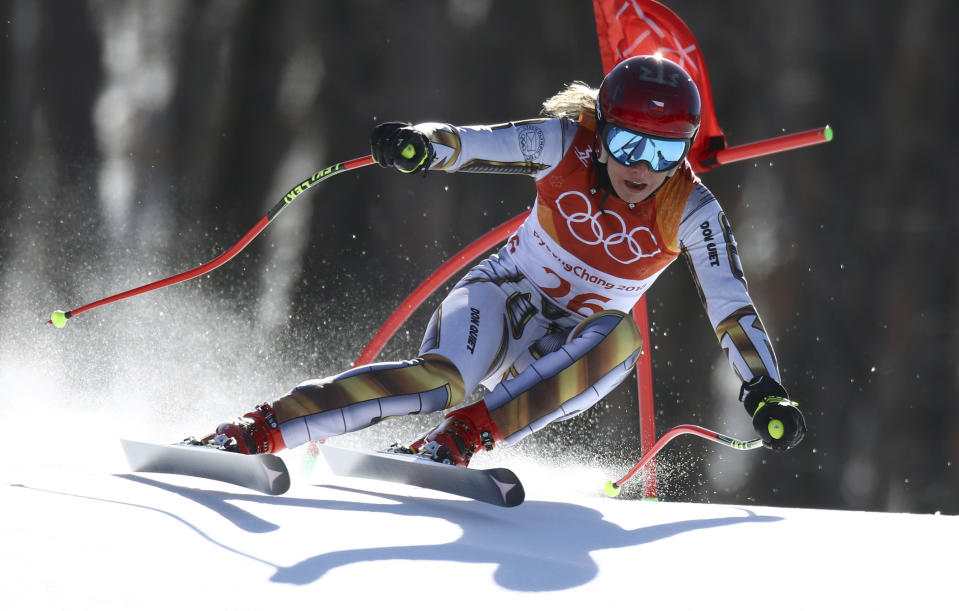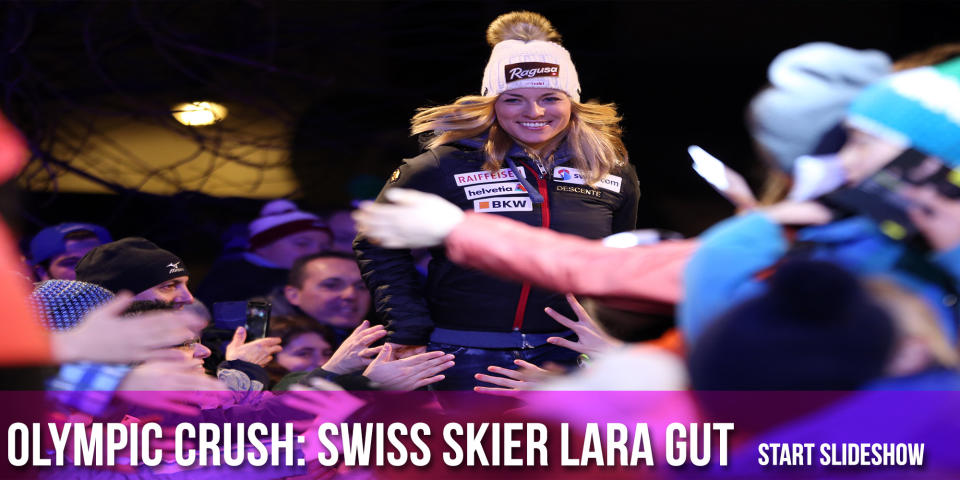How a snowboarder became a 'superhero' and won alpine skiing gold
PYEONGCHANG, South Korea – When she slips into the skintight suit, embellished with gold accents, gunmetal gray triangles and silver trimming, Ester Ledecka does not feel like a skier and she does not feel like a snowboarder.
“I’m a superhero,” she said.
Otherworldly powers seem the only explanation for what Ledecka did to the best skiers this world has to offer at the PyeongChang Games on Saturday. This was Rulon Gardner beating Alexander Karelin. It was the Miracle on Ice. It was Emil Zatopek dominating the first marathon he ever ran.
It was a snowboarder winning an alpine skiing Olympic gold medal.
What to many in the haughty skiing world felt like a gimmick – the best parallel snowboard racer in the world trying to become the first athlete ever to compete in snowboard and ski races at the same Winter Games – birthed something far more historic. Every bit as capable on two planks as one, Ledecka unleashed a barrage of speed on the Super-G course at Jeongseon Alpine Centre to unseat reigning gold medalist Anna Veith by a .01-second margin that left Ledecka practically paralyzed with confusion.
Olympic gold medalists celebrate, huzzah, drop to their knees and cry. Dumbfounded, slack-jawed, numbed by what she’d done, Ledecka stared at the video board, certain something was off. NBC had cut away from the race and declared Veith the gold medalist, never considering that the 38th-ranked Super-G skier in the world whose best finish this year was 24th and who never had so much as podiumed in one of her 20 World Cup races could muster what Ledecka mustered.
Neither, to be fair, did Ledecka.
“I was wondering what just happened,” she said. “Is this kind of a mistake? I was thinking, ‘OK, they’re going to change the time. I’m going to wait for it a little bit. And they’re going to put some more seconds on.’ I was just staring at the board and nothing was happening and everybody was screaming. I just started to think, ‘OK, this is weird. Why do they scream?’”
They screamed because it was all real. STR – the superhero name Ledecka brandishes in her snowboard races – had introduced herself to the ski world with cinematic flair, the sort her brother, Jonas, would appreciate. He is a comic-book artist and designed the suit Ledecka wore atop the medal stand, where she removed her goggles and revealed her eyes to acknowledge the crowd, though only for a moment.
Soon thereafter, she shielded them once more, and when a press officer asked her to remove them in front of an international media corps that was eager to brand her a “sensation,” Ledecka demurred.
“I don’t have no makeup,” she said.
The room roiled with laughter. Here was a 22-year-old from the historic center of Prague, who for most of her life had been known as the daughter of Janek Ledecky, a Czech pop star most famous for his rock operas. Beyond that, she was the granddaughter of Jan Klapac, a two-time Olympic hockey medalist who was on the team that beat the USSR in the 1969 world championships, a year after the Soviet Union was one of five countries that invaded Czechoslovakia. For three consecutive years she has ranked as the world’s top parallel snowboarder, a racing sport far more popular in Europe than the United States, but even then she was more a national treasure than international.

Then came Saturday, when the world tried to measure the difficulty of what she had done and still couldn’t comprehend it. Ski racers struggle to cross disciplines; typically, they are either a speed skier, excelling in downhill and Super-G, or a technical skier, preferring slalom and giant slalom. Ledecka was crossing entire sports. She didn’t just beat Lindsey Vonn. She resembled Bo Jackson.
“She’s one of the best athletes in the world,” Justin Reiter said. “Fact.”
Reiter is Ledecka’s snowboard coach, and together with the Czech skiing coach, Tomas Bank, they crafted the plan to make this possible. They know Ledecka is a dutiful study, the sort who craves perfection, a polyglot (Czech, English, German, Greek and Slovak) in addition to a sporting polymath. They split her training into three-week-or-so blocks, spending chunks of time on skiing and others snowboarding. She hopscotched around the world for races in both sports. It felt, Ledecka said, almost like a custody arrangement in which she went back and forth between parents.
“She’s been doing this since she was 7 years old,” Reiter said. “And all the way along, someone has told her, ‘You can’t ski and snowboard. You have to pick. You have to pick.’ And she said no. And you take that and put it with the heart and head that is Ester, and the work ethic and passion, and it’s just a matter of time before –”
Before he could finish his sentence, Reiter stopped himself. In the distance, a replay of Ledecka’s run was playing on the video board.
“Holy f—,” Reiter said. “She almost fell.”
Bank laughed. He figured Ledecka needed a near-flawless run to compete with Veith, the silver medalist from Austria, or bronze medalist Tina Weirather. While she loved skiing, she started competing in World Cup races only two years earlier, and though her skills were abundant, never before had she put all of the elements together outside of a pair of training runs in which she finished first.
“She knew if the perfect run happens,” Bank said, “it should be really, really good.”
“And this one wasn’t perfect,” Reiter said.
“I heard something in my radio,” said Bank, pointing to the communication device used by coaches as they stand on the hill. “It was screaming. I think, ‘OK, it’s fifth place or sixth place.’ I had my mobile phone with live timing. I look down. I almost dropped it. There were a lot of mistakes. But she had good skis. On this hill, without good skis, there’s no chance anyway.”
So, the skis. In the aftermath of Ledecka’s win, as everyone tried to process what happened, all sorts of questions were asked. Was it true Ledecka had borrowed the skis of Mikaela Shiffrin, the American star who skipped the Super-G, to win the race? Well, no. Not exactly. Her equipment supplier, Atomic, gives Ledecka used skis because she doesn’t race enough to break them in properly. So, yes, they might have been Shiffrin’s at one point. Also, some wondered, is Ledecka related to star American swimmer Katie Ledecky, with whom her family shares a last name? “I hope so,” Ledecka said excitedly. Alas, she isn’t.
The other big question was whether Ledecka might abandon her plans to compete in the parallel giant slalom snowboard race to take a crack at the marquee skiing event, the downhill.
“She’s also good in downhill, no?” an Austrian coach said.
“She’s better in downhill,” Bank said.
“F—,” the Austrian coach said, “that makes it even worse.”
He likely need not worry. While the downhill is scheduled for Wednesday and PGS qualifications are Thursday with the finals Feb. 24, Ledecka, her coaches and her family hinted that snowboarding was the priority from the start and alpine more a fanciful diversion.
“The plan and the goal for Ester was to show she can honestly ski in a top 30, maybe top 20, and then to focus on snowboarding, of course,” Janek said. “Because she’s not able to race in downhill because of time conflicts with snowboard and downhill is her strongest alpine discipline, Super-G was the chance.”
Think about that. Top 30. Maybe top 20. Now a gold medal. And not just a gold medal but one she celebrated when she was supposed to be elsewhere. Yes, the original plan Saturday was for Ledecka to race in the Super-G, hop into a car, hustle over to the PGS course and train during the afternoon.
“It’s like Forrest Gump,” Bank said. “She wants to be everywhere. But that’s just a story. This is real.”
More Olympic coverage from Yahoo Sports:
• Vonn speaks on deadly Florida shooting: ‘I can’t understand it’
• Adelson: Holcomb’s legend lives on with U.S. bobsled team
• Vonn’s timeline filled with hate tweets after Super-G loss
• Wetzel: Rippon off to have a stiff drink with mission accomplished
• Adelson: Why Zhou could be star to watch at 2022 Olympics




